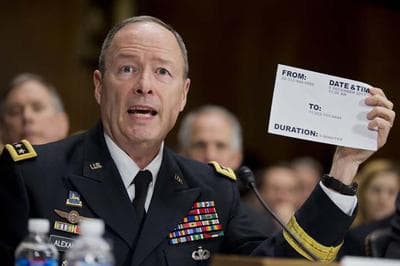Advertisement
Reining In The N.S.A.
ResumeA Federal judge throws down the gauntlet on the National Security Agency. How will the N.S.A. respond? We’ll go deep with The New Yorker’s Ryan Lizza.

So, Santa’s not the only one making a list of who’s naughty and nice we learn. The NSA’s making lists on everything. In the decade-plus since 9/11, the NSA has gone on a data collection moon shot, grabbing data all over, data on you. Edward Snowden pulled back the covers. This week, a federal judge said the authors of the US Constitution “would be aghast” at what’s been going on. “Almost Orwellian,” in its destruction of privacy, he wrote. So, what now? 60 Minutes is not exactly tearing the lid off. Reporter Ryan Lizza goes deeper. He’s with us. This hour On Point: reining in the NSA.
-- Tom Ashbrook
Guests
Ryan Lizza, Washington correspondent for The New Yorker. (@RyanLizza)
Devlin Barrett, Justice Department reporter for The Wall Street Journal. (@DevlinBarrett)
From Tom's Reading List
The New Yorker: State of Deception — "In the days after 9/11, General Michael Hayden, the director of the N.S.A., was under intense pressure to intercept communications between Al Qaeda leaders abroad and potential terrorists inside the U.S. According to the inspector general’s report, George Tenet, the director of the C.I.A., told Hayden that Vice-President Dick Cheney wanted to know 'if N.S.A. could be doing more.' Hayden noted the limitations of the fisa law, which prevented the N.S.A. from indiscriminately collecting electronic communications of Americans. The agency was legally vacuuming up just about any foreign communications it wanted. But when it targeted one side of a call or an e-mail that involved someone in the U.S. the spy agency had to seek permission from the fisacourt to conduct surveillance."
The Washington Post: Judge: NSA’s collecting of phone records is probably unconstitutional — "'I cannot imagine a more ‘indiscriminate’ and ‘arbitrary invasion’ than this systematic and high tech collection and retention of personal data on virtually every single citizen for purposes of querying and analyzing it without prior judicial approval,' said Leon, a judge on the U.S. District Court for the District of Columbia. 'Surely, such a program infringes on ‘that degree of privacy’ that the founders enshrined in the Fourth Amendment.'"
Lawfare: Matinee Idols: Ryan Lizza’s Flawed Account of Surveillance Law — "The piece is marred by Lizza’s flawed description of surveillance law. He oversimplifies, and therefore distorts, the legal issues in a way that fits his narrative of Senator Wyden as the hero of his story. Perhaps the most important problem is that Lizza doesn’t understand the issue with FISA prior to September 11 that led to these programs. He explains that while the NSA 'was legally vacuuming up just about any foreign communications it wanted,' it needed FISA court permission 'when it targeted one side of a call or e-mail that involved someone in the United States . . . .'"
Snowden To Brazil? An Open Letter Draws Eyes
Vincent Bevins, Brazil correspondent for the Los Angeles Times. Runs the "From Brazil" blog at Folha de Sao Paulo. (@Vinncent)
This program aired on December 18, 2013.